
Federico Fellini was an Italian film director and screenwriter. He is known for his distinctive style, which blends fantasy and baroque images with earthiness. He is recognized as one of the greatest and most influential filmmakers of all time. His films have ranked highly in critical polls such as that of Cahiers du Cinéma and Sight & Sound, which lists his 1963 film 8+1⁄2 as the 10th-greatest film.

Roberto Gastone Zeffiro Rossellini was an Italian film director, screenwriter and producer. He was one of the most prominent directors of the Italian neorealist cinema, contributing to the movement with films such as Rome, Open City (1945), Paisan (1946), and Germany, Year Zero (1948). He is also known for his films starring Ingrid Bergman, Stromboli (1950), Europe '51 (1952), Journey to Italy (1954), Fear (1954) and Joan of Arc at the Stake (1954).
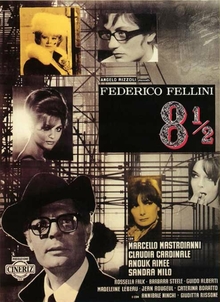
8½ is a 1963 comedy drama film co-written and directed by Federico Fellini. The metafictional narrative centers on Guido Anselmi, a famous Italian film director who suffers from stifled creativity as he attempts to direct an epic science fiction film. Claudia Cardinale, Anouk Aimée, Sandra Milo, Rossella Falk, Barbara Steele, and Eddra Gale portray the various women in Guido's life. The film was shot in black and white by cinematographer Gianni Di Venanzo and features a score by Nino Rota, with costume and set designs by Piero Gherardi.
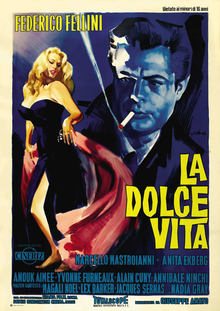
La dolce vita is a 1960 satirical comedy-drama film directed by Federico Fellini. It was written by Fellini, Ennio Flaiano, Tullio Pinelli, and Brunello Rondi. The film stars Marcello Mastroianni as Marcello Rubini, a tabloid journalist who, over seven days and nights, journeys through the "sweet life" of Rome in a fruitless search for love and happiness. The screenplay can be divided into a prologue, seven major episodes interrupted by an intermezzo, and an epilogue, according to the most common interpretation.

Giulia Anna "Giulietta" Masina was an Italian film actress best known for her performances as Gelsomina in La Strada (1954) and Cabiria in Nights of Cabiria (1957), for which she won the Cannes Film Festival Award for Best Actress at the 1957 Cannes Film Festival.
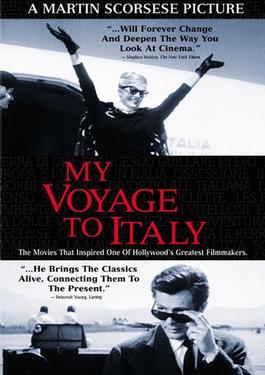
My Voyage to Italy is a personal documentary by acclaimed Italian-American director Martin Scorsese. The film is a voyage through Italian cinema history, marking influential films for Scorsese and particularly covering the Italian neorealism period.

La strada is a 1954 Italian drama film directed by Federico Fellini and co-written by Fellini, Tullio Pinelli and Ennio Flaiano. The film tells the story of Gelsomina, a simple-minded young woman bought from her mother by Zampanò, a brutish strongman who takes her with him on the road.

The Flowers of St. Francis is a 1950 film directed by Roberto Rossellini and co-written by Federico Fellini. The film is based on two books, the 14th-century novel Fioretti di San Francesco and La Vita di Frate Ginepro, both of which relate the life and work of St. Francis and the early Franciscans. I Fioretti is composed of 78 small chapters. The novel as a whole is less biographical and instead focuses on relating tales of the life of St. Francis and his followers. The movie follows the same premise, though rather than relating all 78 chapters, it focuses instead on nine of them. Each chapter is composed in the style of a parable and, like parables, contains a moral theme. Every new scene transitions with a chapter marker, a device that directly relates the film to the novel. On October 6, 1952, when the movie debuted in America, where the novel was much less known, the chapter markers were removed.

I vitelloni is a 1953 Italian comedy drama film directed by Federico Fellini from a screenplay written by himself, Ennio Flaiano and Tullio Pinelli. It stars Franco Interlenghi, Alberto Sordi, Franco Fabrizi, Leopoldo Trieste, and Riccardo Fellini as five young Italian men at crucial turning points in their small town lives. Recognized as a pivotal work in the director's artistic evolution, the film has distinct autobiographical elements that mirror important societal changes in 1950s Italy.
The Nastro d'Argento for Best Director is a film award bestowed annually as part of the Nastro d'Argento awards since 1946, organized by the Italian National Association of Film Journalists, the national association of Italian film critics.
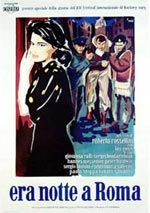
Escape by Night, also titled Blackout in Rome, is a 1960 Italian–French war drama film directed by Roberto Rossellini.

Tullio Pinelli was an Italian screenwriter known for his work on the Federico Fellini films I Vitelloni, La Strada, La Dolce Vita and 8½.

Maria Grazia Buccella is an Italian actress, glamour model and beauty pageant titleholder who was crowned Miss Italia 1959 and represented her country at Miss Universe 1959.

Otello Martelli was an Italian cinematographer whose films include La Dolce Vita.
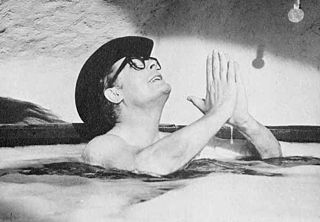
The list of the A hundred Italian films to be saved was created with the aim to report "100 films that have changed the collective memory of the country between 1942 and 1978". Film preservation, or film restoration, describes a series of ongoing efforts among film historians, archivists, museums, cinematheques, and non-profit organizations to rescue decaying film stock and preserve the images they contain. In the widest sense, preservation assures that a movie will continue to exist in as close to its original form as possible.
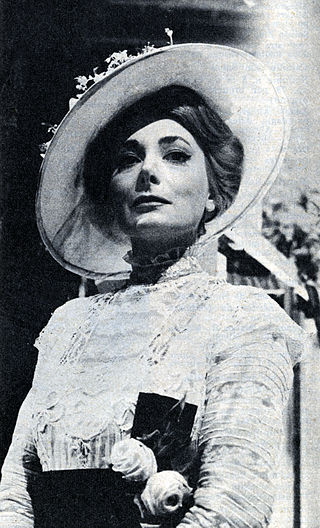
Rossella Falk was an Italian actress. She had a long career and is possibly best known for appearing in 8½ by Federico Fellini in 1963.
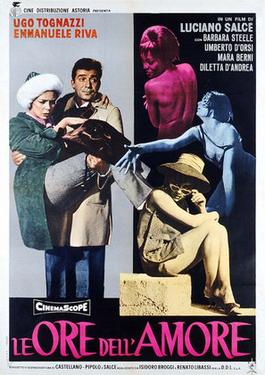
The Hours of Love is a 1963 Italian comedy drama film directed by Luciano Salce.
Events from the year 1908 in Italy.
Master of Love is a 1972 commedia sexy all'italiana co-written and directed by Brunello Rondi.
















